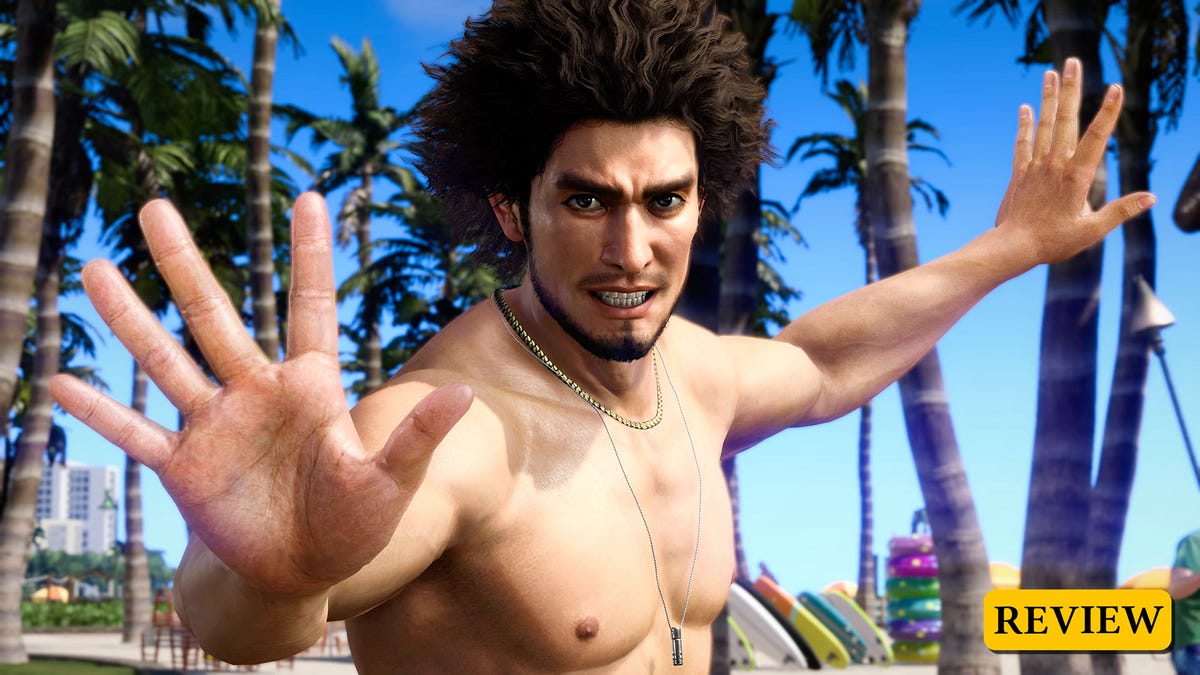I’m soaking up the sun as I stroll along the beautiful beaches of Hawaii when suddenly a group of suspicious-looking characters take notice. As they approach, threatening me, I’m transported from the reality of Hawaii around me to some kind of alternate dimension where I’m expected to pull off some thrilling heroics. My enemies no longer look like your average tough guys on the street—their eyes glow red, they’re able to spew toxic fumes at me. But their new monstrous appearance is no match for my sweet selection of skills, my trusty baseball bat, and a crew of comrades who are ready to dive in with their own eccentric combat skills. But before they throw down, they’ll have to wait their turn, of course.
Like a Dragon: Infinite Wealth is the latest in the long-running series of games formerly known as Yakuza. Starting in 2005 on the PS2, Yakuza introduced the world to its gripping tale of Japanese gangsters struggling to survive the complex loyalties and alliances of the criminal underworld, often forced to fight in overwhelming situations in order to survive.
Infinite Wealth itself is a direct sequel to 2020’s Yakuza: Like a Dragon, which departed significantly from the standard brawling action that has long been the series’ bread and butter. As in that game, combat here is entirely turn-based, with all of the RPG stats and features you know from games that are usually set in more fantastical realms. Starring one of the most charismatic characters of our time, Ichiban Kasuga, Infinite Wealth tells a satisfying and intriguing tale of mystery and organized crime. And it’s all set in a digestible RPG that rewards the time you put into it without feeling burdensome or unapproachable.
Pre-order Like a Dragon: Infinite Wealth: Amazon | Best Buy |Humble Bundle | Target
A heroic fantasy unrestrained by the bounds of reality
Though Infinite Wealth is set in the real world and follows the gritty and complicated lives of people stuck in a life of organized crime, the game never feels anything short of epic, especially in combat. Most cutscenes and narrative developments are grounded in reality, but the fighting almost seems to take place in a parallel universe in the mind of protagonist Ichiban Kasuga, who tends to see the world like a fantasy game, with himself the hero of said game.
The game takes on a different personality once the fists and weapons start flying, one that embraces the tried and true staples of turn-based combat in a fantasy RPG. It’s joyous and lively—a breath of fresh air in a genre so often dominated by the same fantasy character archetypes in the same old predictable ways.
Infinite Wealth deals in those archetypes—your tanks, healers, damage dealers, and so on—but it makes them its own, with style and confidence. Enemies shift into twisted monstrous appearances of their real-world selves once the combat starts. Fighting animations are often explosive, vibrant, and fitting for each character’s personality. The flow of combat never fails to feel exciting and fresh, but also familiar. This is an RPG through and through: Characters have hit points and magic points, and the latter can be used to deploy all manner of offensive and defensive abilities. You’ll get better as you level up, and there are tons of ways to improve your stats via consumable items and better equipment.
If you’re a veteran of turn-based fantasy roleplaying games, you’ll find that trusty rhythm of buff, debuff, attack, and defend here in gorgeous full form and not merely as a tongue-in-cheek, fourth-wall breaking gimmick. Playing Infinite Wealth was a reminder for me of how much I love turn-based combat, because the game constantly rewarded me for playing with strategy. That dopamine rush of pulling off several well-selected turns is so rewarding that on the rare occasions I had to grind to push forward in the story, I was excited to get into more brawls. The combat is strategic, yet silly. Deep, yet approachably fun. It rarely felt exhausting to go through round after round of combat. And defeat didn’t feel mean or humiliating.
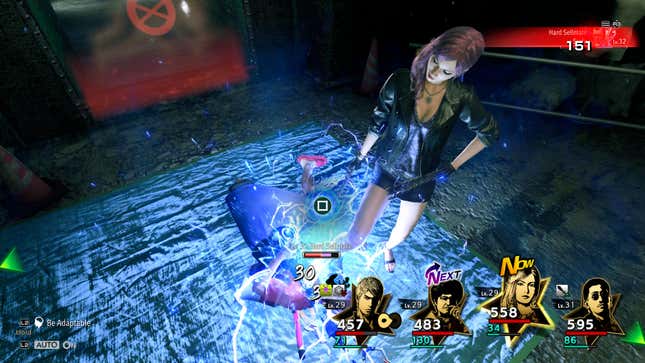
Infinite Wealth’s combat isn’t just about meeting numerical prerequisites. Yes, if you’re underleveled for a specific area or boss fight, you might be in some trouble. But I rarely felt like the game was unfair or forcing me to do my leveling-up homework. Fights that were a few levels above me weren’t impossible; they just required a more thoughtful approachthat didn’t neglect the essential roles of buffs and debuffs. There were some bosses that sent me to a couple of Game Over screens, and it was clear that I was underleveled and under equipped when this happened. But if I kept my head in the game and focused on exploiting as many enemy weak points as possible and making each turn count, I could come out on top. And that feeling of losing a few times, only to come back and out think my foes to victory, never got old.
Though you can switch out your characters’ classes, referred to as Jobs in Infinite Wealth, I rarely did this on my first playthrough. Each stock character class affords a solid selection of abilities, and you’ll quickly spot who should take the lead on what role.
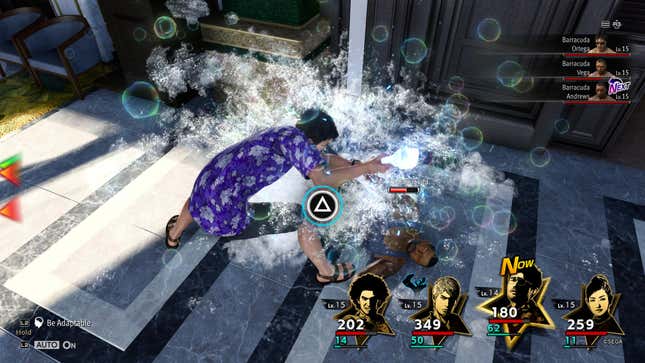
Some characters will clearly be better for dealing damage, like longtime series protagonist Kiryu, while others are very dynamic. Kasuga himself has a solid amount of attack abilities, but also functions well as a healer and support character (I had him running around juicing everyone’s defenses during the harder moments). Meanwhile characters like Nanba, a former nurse whose direct attacks aren’t as powerful as those of other characters, can serve as a solid healer as well as a blisteringly effective damage-dealing magic user. Digging into each character’s abilities, all of which are explained in in-game text during combat, means that you can learn as you go. This isn’t a game you need a PhD in, yet it’s not overly simplistic either.
Infinite Wealth’s combat is also thrillingly kinetic. On your turn, you can move in a limited circle surrounding your character. This placement is essential as many attacks will force enemies to knock into one another, their surroundings, or into the weapon of a comrade who’s more than happy to take an extra swing if the enemy falls into their threat range. And as characters walk around the battlespace, unrestrained by their turn in the combat order, there’s a sense of nailing the timing of your attacks correctly. You can swiftly deal damage to multiple opponents if you stay focused and look for easily missable opportunities.
But of course, combat isn’t the only thing you’ll do in Infinite Wealth, as the game is more than ready to deliver hours and hours of minigames and side activities, some based directly on games like Pokémon and Animal Crossing.

Infinite Wealth is deep, but not overwhelming
Infinite Wealth is a big game. There’s a 40+ hour main story, tons of side stories, mini-games for dating, gig work, farming, and character battling. You can spend time hanging out with your party members to deepen your relationships with them (which pays off in combat), and you can explore some randomly generated dungeons to test your strengths.
But whereas many other RPGs can feel too big to wrap your head around, Infinite Wealth somehow feels vast without making you feel lost. Some of this, I think, has to do with the game’s relatively smaller maps in comparison to other RPGs. Both locations in Hawaii and Japan are maps you can memorize and travel around with ease, dotted with activities that make your combat skills better, be that by unlocking new combined attacks through raising your bond level with each character, or by finding new Jobs, items, and weapons to diversify your combat skills.
Infinite Wealth’s side activities are a rising tide, elevating the rest of the game as you spend more time with them. Some have an exquisite level of depth, such as Dondoko Island, which is a self-contained, fully featured resort management sim baked right into the game.
Side activities simply add more to the game. More strategy to manage, more combat skills to unlock, and more time spent with this game’s wonderful cast of characters, who for me were a gravity well that kept me glued to the main story more than anything else.
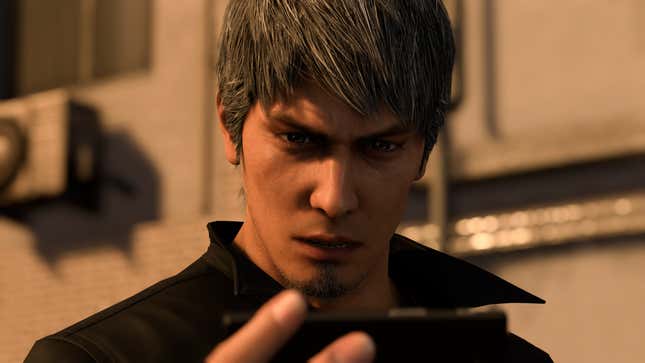
Infinite Wealth’s story works for Yakuza veterans and newcomers alike
Infinite Wealth follows the stories of Ichiban Kasuga and Kiryu Kazuma, men who seem to be unable to escape the harsh realities of organized crime. The former takes up most of the game, while a couple of late-game chapters have you take control of Kiryu. At the heart of the game is a direct goal: Kasuga is sent to Hawaii to find someone important. Though this person will continue to elude him for some time, what he does find on the island of Hawaii is a complex network of organized crime syndicates all vying for power and control.
Kasuga quickly gets swept up into Hawaii’s crime scene as he continues his search, meeting many new characters along the way, establishing trust and challenging opposition. The game’s narrative is very good at introducing characters with long and surprising arcs, and though it’s another entry in a long-running series of games, newcomers won’t feel terribly out of place. Some references to past events and the structure of the Yakuza itself might feel a little much for someone brand new, but Infinite Wealth has a focused and self-contained story with multiple twists and turns, heroes you’ll come to love and villains you’ll want to swing a bat at.

Some of the game’s individual chapters, however, tend to revolve around a plot structure that grows predictable, one that sees some rising, out of control action that’s ended by the appearance of another character you weren’t expecting or some other, out-of-the-blue occurrence. These situations don’t meet the exact definition of a deus ex machina, but they can feel a bit too convenient and contrived.
Despite this predictable pattern of storytelling and action, the main story pays off with a long tale that explores the topics of family and trust. Characters aren’t just on screen to be mean and shoot people (though there are some rather bloody scenes from time to time). I found myself playfully wondering where the story would go; sometimes it went in a direction I saw coming from miles away, other times one that completely surprised me. But whether I was catching on to rising foreshadowing, or being hit with a twist I didn’t see coming, I thoroughly enjoyed Infinite Wealth’s narrative—especially its cast of characters, headed by its simply awesome protagonist.

Ichiban Kasuga is an unparalleled hero
If you’ve played the original Like a Dragon or the recent The Man Who Erased His Name, you’ll come to Infinite Wealth knowing who Ichiban is. A former Yakuza member, he spent 18 years of his life behind bars, stepping out into the real world in his 40s. And he seems a little youthful for his age, perhaps even a little dumb, but in a loveable sort of way. The game opens with him working a mostly average desk job after having seemingly left a life of crime behind him. But just when you thought he was out, he gets pulled back in.
What’s so surprising, however, is that Kasuga fails to follow the more stereotypical path of male characters in such a scenario, one that often sees aggression and confrontation matched with accelerated anger and violence. Sure, he’s more than happy to get into a brawl with his bat and his buddies, but his undying optimism in the face of difficulty and his willingness to extend kindness and forgiveness to those who wronged him displays such a high level of emotional intelligence that he defies the expectations of the crime drama genre. When the going got tough, I found myself desperate to hear Ichiban deliver a positive spin, an opportunity to overcome adversity.

That Infinite Wealth takes place in the real world makes these attributes of Kasuga even more resonant. These aren’t characters obsessed with finding some mysterious, magical plot device to stop an evil overlord in some fantasy realm. Instead, these are characters with relatable flaws and concerns, seeking to right wrongs and improve each other’s lives. This is not a tale of escapism. While the story may involve criminal dealings of the kind few can claim to have knowledge of, each character’s investment in the story, the reason they’re fighting in the first place, feels more relatable than it likely would if this were a high fantasy narrative with all of the unrealistic trappings of the genre. Without hyper fictitious lore to burden the player with, Infinite Wealth is a story you can see yourself in.
Ichiban made me laugh and cry so often during Infinite Wealth’s main story. I came to see him as a heroic figure not because he could beat the crap out of the bad guys (which he certainly ain’t bad at) but because he inspired in me an enthusiasm for life, both in and out of the game. One scene in particular sees Kasuga deliver such a positive philosophy on living life in your 30s and 40s, doing so without the burden of shame for not having achieved certain milestones, that I was immediately brought to tears, ending that night’s gaming session with a sense of optimism about my own life.
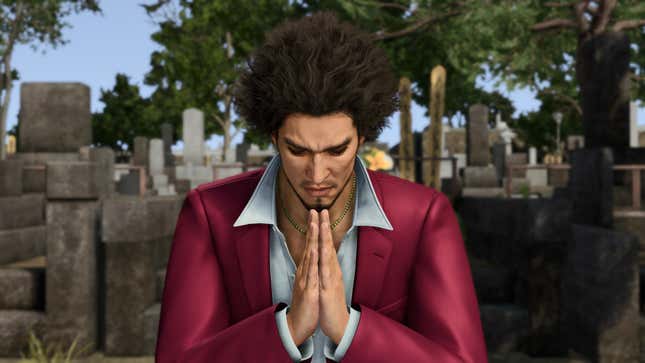
The emotional wealth that Kasuga affords the game works to make him a great and inspiring character, someone who you enjoy inhabiting. But he also makes the story more interesting. This is not a bog-standard tale of a man out to get vengeance on the mob.
A few rough edges, room for improvement, and a regrettable price structure
Infinite Wealth arrives in early 2024 and is already, in my mind, a strong contender for one of the best gaming experiences of the year. That said, there were a few elements that could have been better. While these didn’t totally sour the experience, they did nag at me over the game’s long campaign.
Infinite Wealth’s graphical presentation is one of its more underwhelming aspects, particularly in cutscenes which are often filmed with cinematic camera placement that doesn’t work well with the game’s mostly duller textures and wooden character animations. Ichiban himself is probably the best-looking character and the most well-animated, but even the other main characters are a bit of a step down, with rigid facial and body expressions. There’s an odd-looking, glowing outline surrounding most characters during their closeups, while not so distant textures, even in cutscenes, sometimes just look odd. Non-playable characters suffer even more; we’re talking Oblivion-level oddness and rigidity to facial expressions. It can be a little rough to look at.
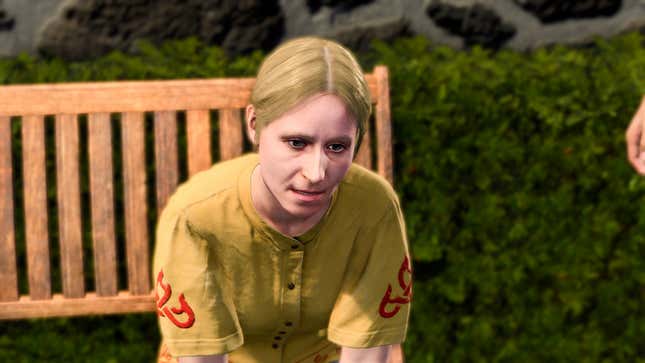
I bring this up not out of some belief that prettier graphics always equal a better game. Rather, it’s because Infinite Wealth’s narrative, with its focus on its excellent characters, deserves a better presentation than what this game offers.
That said, the poor presentation is somewhat offset by the stellar music in Infinite Wealth’s soundtrack, especially in combat. I even took my time with turns on multiple occasions because I was too busy bobbing my head to the variety of upbeat electronica and metal that makes for pure ear candy.
But while I very much love Infinite Wealth’s combat and expect to be pouring many more hours into its dungeon activities to take on greater threats, I do wish it was easier to shop for better weapons and gear. All too often I found myself checking into a weapons shop to find that they had nothing anyone in my party could use. It makes for some laborious treks across the map to find a good upgrade.
I also wish Infinite Wealth didn’t choose to send me to a game over when the main party character dies. Upon Kasuga (or Kiryu when he takes the helm) getting KO’d, you’re taken to a continue screen. This tilts the strategy a bit too much toward prioritizing the main character. To be fair, this only became an issue during the boss fights I stupidly took on while being underleveled, but prioritizing one character’s life over all the others is something I could do without.
Finally, one of the most confusing issues of Infinite Wealth lies in its pricing structure. The base edition runs at the new standard of $70, but there are also $85 and $110 versions.
The biggest problem with this is that the $85 version is required to unlock New Game+. This is a perplexing decision to say the least—especially in a game that is so chock full of activities that you’re unlikely to finish them all in one playthrough. Combat in Infinite Wealth only gets more dynamic and thrilling the more people you have in your party and the more skills and Jobs you have—this is a game that begs to be played a second time with all the abilities you’ve earned. Yet Sega wants you to pay an extra $15 for that privilege. There’s simply no reason for this to be the way that it is, and it’s a major stain on an otherwise stellar RPG.
Despite a truly unfortunate pricing structure, Infinite Wealth is an impressive and satisfying early 2024 title. It features an excellent cast of characters, thrilling combat, and tons of rewarding side activities which rarely feel like an excessive burden of busywork. Infinite Wealth also tells a deeply human story of connection, family, and the importance of maintaining hope in the face of adversity. And it features a powerfully effective combat system that’s thrilling to play and see in action.
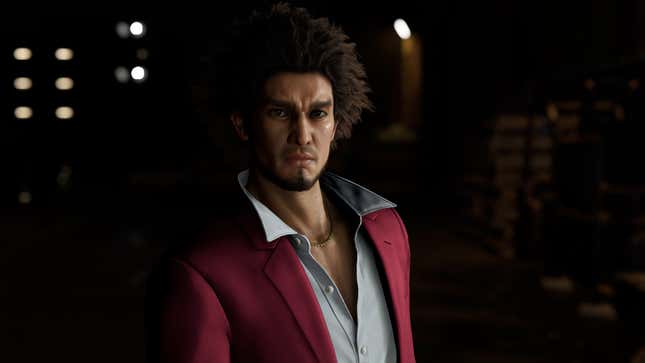
Its story will be most rewarding to those who have played previous Yakuza games, but it tells a self-contained narrative that is usually pretty good about getting you up to speed on past events. And even when the story does dip into its own lore and history too much, which will undoubtedly satisfy long-time fans of the series, Infinite Wealth makes for an excellent introduction to these characters and gives you reasons to be invested in them in the here and now, with an entertaining tale that manages to stay fresh over the course of its many hours of gameplay.
Pre-order Like a Dragon: Infinite Wealth: Amazon | Best Buy |Humble Bundle | Target
.

